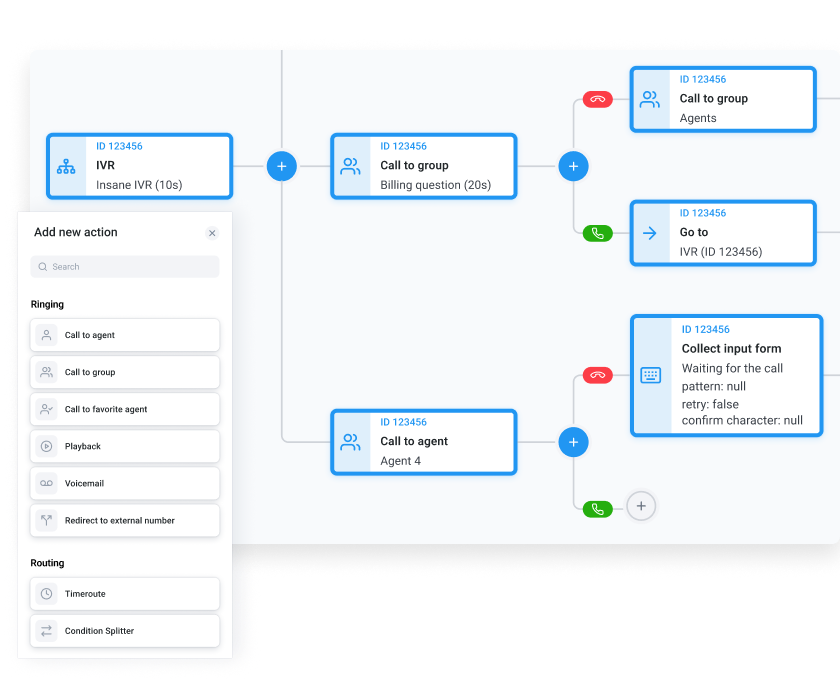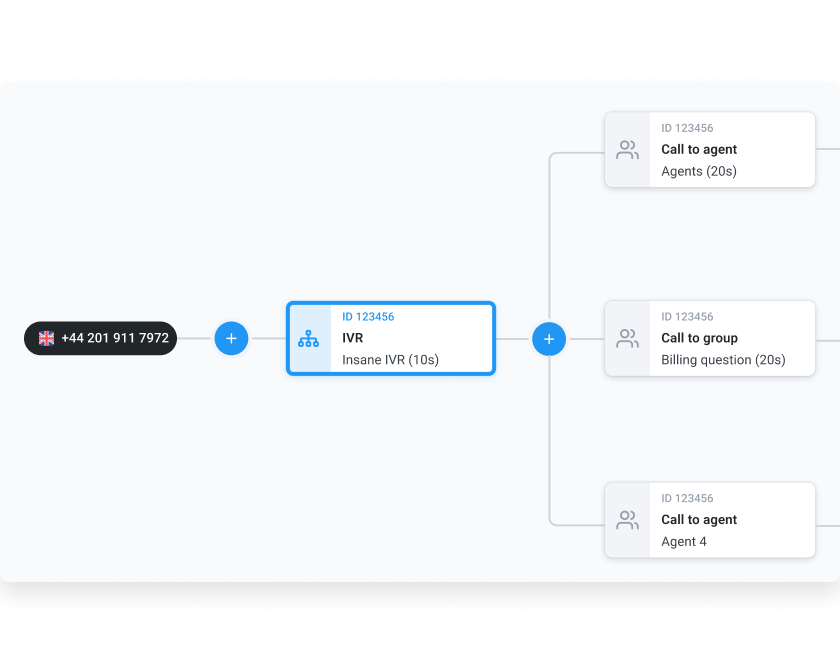
“Press 1 to cut costs. Press 2 to speed up service. Press 3 to impress your customers.” IVR makes all of this happen—without you having to lift a finger.
What if you could boost customer satisfaction and slash operating costs by up to 30%¹? These are just a few of the benefits of IVR (Interactive Voice Response). Still stuck in manual mode? Your competition isn’t.
In a world that demands speed, scalability, and personalization, relying solely on human agents for repetitive tasks isn’t just inefficient—it’s expensive. IVR features have evolved and become strategic allies for top-level efficiency in customer service.
More than just handling incoming calls, a well-designed IVR system transforms the customer experience, eliminates bottlenecks, and strengthens your brand. In this article, you’ll discover the top 11 benefits of an IVR System and understand why it’s a key element in the future of your customer service.
Key Takeaways:
- IVR (Interactive Voice Response) is an automated phone system that guides callers through interactive menus using voice prompts or keypad inputs. It helps direct calls to the right department or provide instant self-service.
- IVR benefits businesses by reducing support costs and easing the load on customer service teams. It improves efficiency by handling high call volumes and resolving simple issues automatically.
- Industry research shows IVR can reduce call center costs by up to 30%, achieve 74% first-call resolution in self-service, and help increase sales revenue by 2–7% and profitability by 1–2%.
Don’t make people rage-hang up. Let your IVR solve their problem.
What Is an IVR System?
IVR, or Interactive Voice Response, is the system you hear when you call a company and are presented with an interactive menu of options.
It’s an automated way to guide your customer to the right place and, based on your answers, connect you to the best-fit agent or department.
IVR call systems can also handle simple tasks from start to finish—like checking your customers’ order status or account balance—without needing a live agent. You get help faster, and support teams stay focused on the more complex stuff.

11 Top Benefits of IVR For Your Business
IVR systems have become a cornerstone of modern customer communication. Below, we’ve listed the 11 biggest benefits of an IVR system for businesses and how they are turning to this technology to enhance their support operations.
Cut Costs Without Cutting Corners
One of the most immediate benefits of IVR is cost savings. In fact, implementing an IVR system can cut call center expenses by up to 30%¹, delivering a strong return on investment right out of the gate.
Instead of hiring more agents to manage growing call volumes, IVR allows businesses to automate high-frequency, low-complexity interactions—like checking account balances, confirming order status, or updating personal details.
Rather than having live agents field hundreds of “Where’s my package?” calls daily, an IVR system can integrate with your shipping software and instantly provide real-time tracking updates.
Create a Better Customer Experience
Over one-third of customers prefer to resolve issues on their own rather than wait to speak with a representative¹. This demand for autonomy is driving businesses to rethink how they handle support, and IVR software is a key part of that shift.
By automating answers to common questions and guiding callers through clear, personalized menus, IVR helps reduce queue times and take pressure off support teams. Customers benefit from faster service and fewer hurdles, while businesses gain efficiency and scalability.
Real-life Application
Picture this: DiscoverCars’ customer service team is overwhelmed because their call volume is skyrocketing—30,000 calls per quarter—and waiting times are increasing.
DiscoverCars’ implementation of CloudTalk’s IVR:
- 25% faster call handling
- 15% boost in customer satisfaction
- 80% reduction in wait times

Today they are handling over 100,000 calls per quarter—more than triple their previous volume—with the same team size.
Read the full case study to learn how DicoverCars’ radically transformed its customer service with CloudTalk’s IVR system.
Be There for Customers—24/7
In our globalized market, customers aren’t all in the same time zone, and they don’t all need help during business hours. Whether it’s a client paying a bill at midnight or someone requesting support from a different continent, service expectations don’t stop at 5 p.m.
That’s where IVR becomes a must. By offering always-on support, businesses can meet customer needs whenever they arise—weekends, holidays, or late at night—without relying on a full-time human presence.
And the impact is real: companies that improve the customer experience with tools like 24/7 IVR access can see a 2–7% increase in sales revenue and a 1–2% boost in profitability².
Scale Faster Without the Chaos
As your business grows, so does the demand on your support team. More customers means more questions, more calls, and more pressure to deliver fast, reliable service. But expanding your workforce every time you scale isn’t always practical—or efficient.
IVR systems offer a smarter path forward. They handle large volumes of repetitive, straightforward inquiries without the need for additional staff.
Whether you’re experiencing steady growth or a sudden spike in activity—like during a campaign launch or seasonal uptick—IVR ensures your support experience remains smooth and consistent.
Extract Valuable Data
Every interaction with your IVR system is an opportunity to learn more about your customers and your operations. From menu selections to call outcomes, these touchpoints generate valuable data that goes far beyond basic call handling.
By analyzing patterns—such as the most frequently chosen options, common drop-off points, or repeated issues—you gain insights into customer behavior, preferences, and pain points. This data can feed directly into product improvements, CX optimizations, and targeted marketing strategies.
Coupled with Analytics, IVR systems also support performance tracking, offering a window into key metrics like call resolution rates, average handling times, and agent performance after a transfer. These insights empower teams to continuously refine their service delivery and identify training needs.
Route Calls the Right Way
Few things frustrate customers more than being transferred from one department to another, only to repeat their issue multiple times. IVR systems solve this by intelligently guiding callers through customized menus and routing them to the correct destination, on the first try.
With IVR, you can set up logic that asks targeted questions at the start of the call—like the type of product or service the customer is calling about, or the nature of the issue. This allows the system to match callers with agents who are best equipped to resolve their specific request.
It’s not just about saving time—it’s about creating a smoother, more personalized experience that respects the customer’s time and reduces internal inefficiencies.

Real-life Application
LKN Strategies, a leading U.S. healthcare consulting firm, was grappling with an outdated phone system. Managing high call volumes across remote teams became increasingly challenging, leading to inefficiencies and customer frustration
The transformation was significant:
- 30% increase in agent utilization
- 20% improvement in first-call resolution (FCR)
- 40% reduction in call abandonment rate

By integrating CloudTalk’s features like IVR call routing, real-time analytics, and CRM integration, LKN Strategies streamlined their communication processes. This not only enhanced customer satisfaction but also empowered their agents to handle calls more efficiently.
Discover how LKN Strategies revolutionized their customer service operations, reading the full case study.
Solve More Issues on the First Try
No one enjoys calling customer service more than once for the same issue. That’s why First-Call Resolution (FCR) is such an important measure of whether your support is actually working.
A well-designed IVR can make a big difference here. Studies show that 74%¹ of issues can be resolved within the IVR self-service system, without the caller needing to speak to a person.
Say It Right, Every Time
Even the best agents can have off days. Under pressure or during high call volumes, it’s easy for small inconsistencies or errors to slip through—whether it’s misquoting a policy, forgetting a step in a process, or just phrasing something unclearly.
That’s where IVR brings real value: it delivers the same clear, accurate message every single time.
With IVR, your messaging is scripted, standardized, and always on point. Whether a customer is calling to check a return policy or hear account details, they’ll hear the correct response, without variation, emotion, or confusion.
This consistency builds trust and eliminates misunderstandings that can lead to repeat calls, escalations, or negative experiences.
Speak Their Language—Literally
A one-size-fits-all approach doesn’t cut it, especially when language becomes a barrier to resolving issues quickly and effectively.
Many IVR systems offer multilingual support, allowing you to tailor the experience based on your customer’s language preference right from the first menu option.
IVR lets you scale multilingual support consistently—without needing to staff a full team of polyglots. It’s a smart, cost-effective way to serve a broader customer base and reduce frustration for non-native speakers.
Build a Brand That Feels Professional
First impressions matter—and for many customers, your IVR is exactly that. When someone calls your business, the way they’re greeted, guided, and supported through the system immediately shapes how they perceive your brand.
A well-structured IVR system sends the right message: this company is organized, efficient, and customer-focused. A responsive IVR experience reinforces the idea that your business is modern and reliable—even before a human gets involved.
Free Up Agents for High-Value Tasks
Let’s face it: IVR can do a lot, but not everything. When the issue is complex, customers need to speak to a real person. And that’s exactly the point—IVR isn’t here to replace your support team, but to make their work more impactful.
By handling the repetitive, routine stuff, IVR gives your agents room to breathe. They’re no longer stuck answering the same low-effort questions all day. Instead, they can focus on the interactions that actually require their expertise: solving complex queries, guiding customers through high-stakes problems, or creating value through consultative conversations.
Stop Holding and Start Helping
Still making your customers sit through hold music and endless “please wait” messages? It might be time to rethink your approach.
If callers are stuck navigating long wait times or being bounced between departments, you’re not just testing their patience—you’re missing an opportunity to do better.
You’ve already seen how IVR services can change that: resolving issues on the first call, lowering costs, and making your brand feel more modern and efficient. Meanwhile, your agents are freed up to focus on the interactions that actually need a human touch.
What if you could see how all of this works right now—no strings attached? CloudTalk specialists are ready to show you how our intelligent IVR delivers real results from the very first call.
Turn off the hold music and schedule a demo to hear how CloudTalk’s IVR sounds better to your customers.
Sources:














